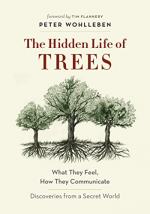|
This section contains 1,589 words (approx. 4 pages at 400 words per page) |

|
Summary
Chapter 13
Trees adapt to many characteristics of their environment - light, dark, wet, dry, hot, cold, lacking in nutrients, stormy, and much more. Beeches thrive in moderate Central European conditions, and other species have adapted to extreme conditions to find space.
Spruce are specialized to cold and long winters. Oils in their needles and bark keep them from freezing. They can have masses of snow fall on them without breaking. Their branches can bend downwards when slow lands on them so that they rest on each other. This also makes the tree narrower, which means that less new snow falls on it. And their trunks are very straight.
Yews and hornbeams grow under beeches, so they use little light and grow slowly. Beeches prioritize their roots so they can store nutrients and even grow back after being eaten or knocked over.
Alders can...
(read more from the Chapters 13-18 Summary)
|
This section contains 1,589 words (approx. 4 pages at 400 words per page) |

|




